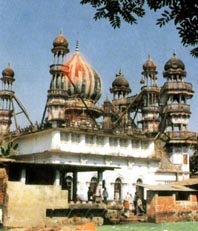|
Message from HE Suhrab Hossain,
The Ambassador of Bangladesh to Thailand It is my great privilege and honor to extend to my fellow countrymen living in the Kingdom of Thailand and also to the government and friendly people of this great country my warm greetings and felicitations on the occasion of the 29th Anniversary of the Independence and national Day of Bangladesh. Today we solemnly remember the Father of the Nation Bangabandhu Sheikh Mujibur Rahman under whose courageous leadership millions of our brothers and sisters made the supreme sacrifice for the freedom and independence of the nation. May their souls rest in peace. During the last few years the government of Prime Minister Sheikh Hasina has carried on with relentless determination the fight against poverty, illiteracy, hunger and deprivation. In recognition of her efforts to fight hunger, the Food and Agriculture Organization has awarded her with the prestigious CERES Gold medal. The government’s efficient handling of the devastating flood of 1998 and its aftermath, when three-fourth’s of the country was submerged under water for several months, with a minimal damage or loss of human lives has been widely appreciated. In recognition her efforts to build a lasting peace in the Chittagong Hill Tracts, a region troubled by two decades of insurgency problems, with the signing of the historic CHT Peace Accord, UNESCO has awarded the Houphouet-Boigny Peace Prize to Honorable Prime Minister Sheikh Hasina. This year has also been a particularly memorable one for the Bangladeshis since UNESCO has declared February 21 as the International Mother Language Day, the day that has been commemorated as the “Shaheed Day” or remembrance day in Bangladesh for the martyrs who laid down their lives on this day in 1952, and whose sacrifice served as an inspiration for the millions of Bangladeshis during the War of Liberation in 1971. Notable achievements have also been made in the fields of women’s empowerment, women’s education and universal education, health care for all, consolidation of the democratic rights of the people and in the other social-economic aspects. In the international arena, Bangladesh has continued to play an active role based on the principles “Friendship to all and malice to none” as laid out by the Father of the Nation. As a member of the United nations, the Non-Aligned Movement, the Organization of the Islamic Conference, the Commonwealth and sub-regional organizations such as the Bangladesh-India-Myanmar-Sri Lanka-Thailand Economic Cooperation, Bangladesh is involved in a wide range of diplomatic activities embracing the people and nations from all corners of the world. The historic ties between Bangladesh and Thailand have also further strengthened and intensified in the course of the past year. Our two countries share a commonality of views on many bilateral and multi-lateral issues of common concern and over the last years have been supporting each other in the various multi-lateral fora. There have been a number of high level visits and numerous exchanges of delegations between our two countries. Our trade and commercial ties continue to grow at a satisfactory rate and a number of Thai investors could take further advantage of the liberal investment opportunities in Bangladesh to invest either singly or in joint venture industries in the country. BIMST-EC, the sub-regional cooperation organization has now been firmly established and its objectives are being translated into specific projects to enhance regional cooperation. We look forward with great pleasure to achieving further consolidation of the relationship between our two countries. On behalf of H.E. the President of the People’s Republic of Bangladesh I take this opportunity to convey our best wishes for the long life, good health, prosperity and profound respect to His Majesty Bhumibol Adulyadej the King of Thailand and also to Her Majesty the Queen. On behalf of the government and the people of Bangladesh I also take this opportunity to extend the warmest greetings and the best wishes to the government and the people of Thailand. May the friendship between Bangladesh and Thailand live long. Thank you. Suhrab Hossain |
|
Location And Climate
Bangladesh lies between 20o 34' and 26o 38' North Latitude and 88o 01' and 92o 41' East Longitude with an area of 1,47,570 square kilometers. The climate of Bangladesh is characterized by high temperature ranges and high humidity, heavy rainfall and marked seasonal variation. Daily temperatures ranges from 19o C to 12o C in winter months (December-January) and in the summer months from April to September it varies between 28o C to 40o C. Soil of Bangladesh may be divided into three main categories, namely hill soil (Chittagong and Sylhet region), terrace soil (Barind and Madhupur tracts) and alluvial and flood plain soil in other parts. Bangladesh contains greater biodiversity than that of many other countries taken together. Indeed, few countries in the world can match its rich and varied flora and fauna. Dhaka, founded by the Mughals in 1608, is the sprawling capital city and is fast turning into a megalopolis of over nine million people. The country’s two seaports are Chittagong and Mongla |
|
Bangladesh - Country Profile Bangladesh was famed in ancient times as a land of bounty and affluence. When Alexander the Great started his expedition for the subcontinent, he headed for Bengal attracted by its legendary plenty. For centuries followed many others - travelers, merchants and invaders. Because of its strategic and intermediary in trade and commerce between South Asia and the Far East, the influence of Bengal spread far and wide. The region played a seminal role in disseminating its rich heritage and tradition, art and architecture, culture and learning in the wider world of Asia and beyond. Kuakata Etymologically the word Bangladesh is derived from the cognate Vanga which was first mentioned in the Hindu scripture - Aitery Aranyak composed between 5000 BC and 500 AD. Literally it means a wetland. In fact, Bangladesh is the largest wetland in the world formed by the interaction of innumerable rivers and streams, its configuration was determined and is being continuously changed by them. Geological evidence indicates that much of Bangladesh was formed 6.5 million years ago during the tertiary era. Human habitation in this region is believed to be very old with its roots in the Paleolithic civilization dating back about one hundred thousand (1,00,000) years. The mighty Gangaridai and Prasioi empires were located in the Bengal region. These were succeeded by the Mauryas (4th to 2nd century BC), the Guptas (4th-5th century AD), the empire of Sasanka (7th century AD), the Pala empire (750-1162 AD) and the Senas (1162-1223 AD). Then followed a long chain of Muslim rule (till 1757 AD) when Bengal reached the zenith of economic affluence and glory. From the 15th century the Europeans, namely the Portuguese, Dutch, French and British traders started arriving, attracted by the riches of Bengal. The British succeeded in establishing their suzerainty when they defeated the then Muslim ruler of Bengal at the Battle of Plassey in 1757 AD. The British rule was subsequently extended to the whole of the subcontinent and continued till mid-August 1947. When the British left, the subcontinent was partitioned into two countries - India and Pakistan. Bangladesh formed the eastern wing of Pakistan. Though numerically in the majority, the Bangalees were treated unjustly and very soon the movement for the autonomy of Bangladesh started because of cultural, linguistic and ethnic differences and economic disparity and deprivation. The Language Movement of 1952 was the first awakening among the people which subsequently led to the movement and struggle for the independence spearheaded by the father of the Nation, Bangabandhu Sheikh Mujubur Rahman. On February 21st, 1952, Rafiq, Salam, Jabbar, Barkat and host of other students and cultural activists embraced martyrdom to uphold the dignity of Bangla - the mother tongue of the then East Pakistan, now Bangladesh. The day has received the recognition of UNESCO to be observed as the ‘International Mother Language Day’ throughout the world. His historic Six-point Program, the Magna Carta, structured the genesis of the country’s independence.
Triturating the thuggery of long colonial domain Bangladesh emerged as an independent country on March 26, 1971 under the charismatic leadership of Mujibur Rahman at whose call the entire nation stood like a rock and waged a heroic and sanguinary struggle, finally succeeding in vanquishing the then marauding Pakistan occupation forces on December 16, 1971. As Bangabandhu started steering and rebuilding the war-torn nation the reactionary forces struck back and assassinated him along with his kith and kin followed by the equally dastardly murders of his close associates and confidants. After a long twenty-one years, on June 23, 1996 Sheikh Hasina, the daughter of Bangladesh’s founding father, was overwhelmingly mandated to assume the leadership of the country through a protracted struggle for the restoration of democracy. Bangladesh is now well set on the course of progress and prosperity. |

 Chandanpura
Mosque, Chittagong
Chandanpura
Mosque, Chittagong
 Royal
Bengal Tiger swimming in a creek of Sundarbars
Royal
Bengal Tiger swimming in a creek of Sundarbars